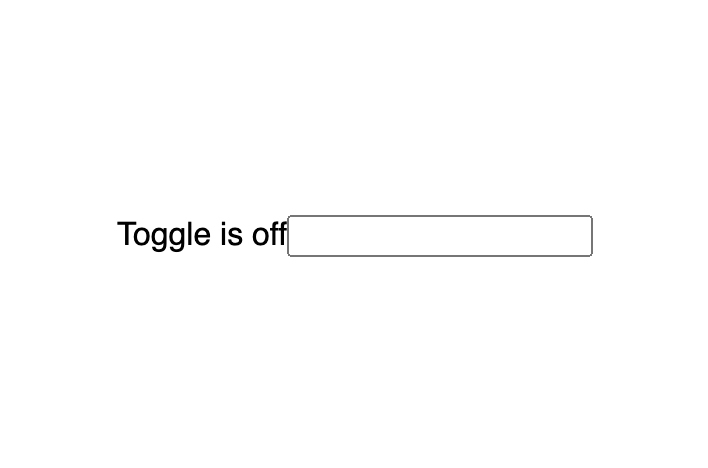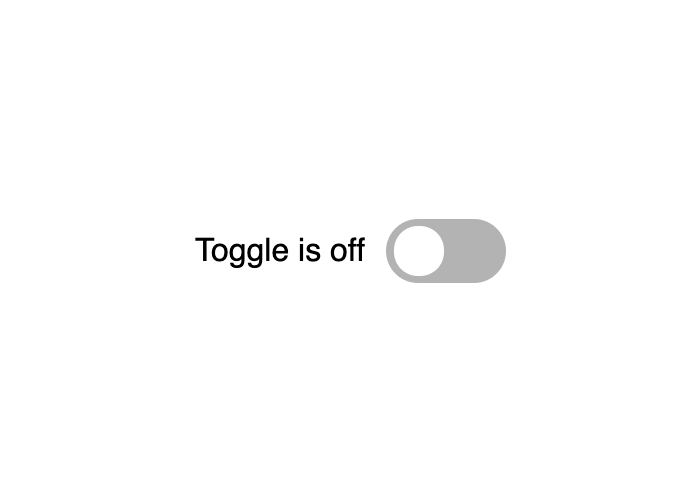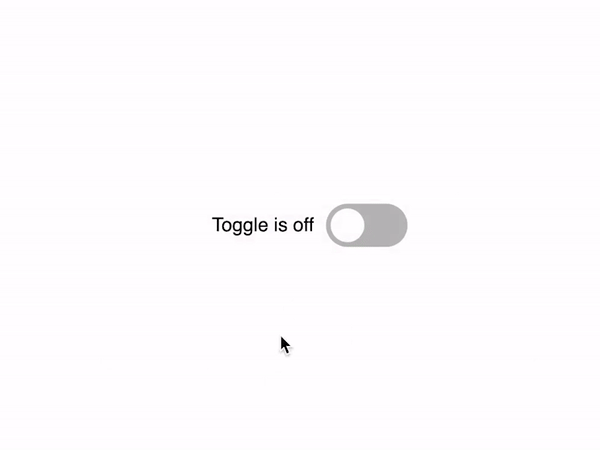Creating a Switch Toggle in React using styled-components.

Karl Taylor
Posted on December 15, 2021

I always find myself every now and again creating a "Switch" or "Toggle" component for a client project.
After making them quite a few times I've decided to put my findings down in this post.
They can be super easy to make, and there's a few nuances that go with them. Let's begin.
Note: I've built this using the technologies I use the most:
react,typescriptandstyled-components. But the CSS can be applied to any frontend stack :)
The whole component is built using just 4 components.
import styled from "styled-components";
const Label = styled.label``;
const Input = styled.input``;
const Switch = styled.div``;
const ToggleSwitch = () => {
return (
<Label>
<span>Toggle is off</span>
<Input />
<Switch />
</Label>
);
};
```
This gives us something like this:

Now we actually don't want to show the `<input>`. But we **do** want it to be of `type="checkbox"`.
This allows the user to be able to click on anything inside the `<label>` to trigger the `onChange` event, including our `<span>` element.
> Note: It's important here to keep the input in the DOM by setting `opacity: 0` and `position: absolute`. Why?
- `opacity: 0` will hide it from the user
- `position: absolute` takes the element out of the normal doument flow.
- This allows the user to "tab" to the label/input and use the spacebar to toggle the element.
```tsx
const Input = styled.input`
opacity: 0;
position: absolute;
`;
// Set type to be "checkbox"
<Input type="checkbox" />
```
I'll add a few styles to the `<label>` component, it's wrapping everything, so I want it to be `display: flex` to align the `<span>` and `<Switch />` vertically.
The `gap` gives us a straight forward 10px gap between elements, and the `cursor: pointer` gives the user visual feedback saying _"Hey! 👋 you can click me!"_.
I'll also add styling to the `<Switch />` element.
```tsx
const Label = styled.label`
display: flex;
align-items: center;
gap: 10px;
cursor: pointer;
`;
const Switch = styled.div`
width: 60px;
height: 32px;
background: #b3b3b3;
border-radius: 32px;
`
```
We now have something like this:

Next up I'm going to create a [pseudo-element](https://developer.mozilla.org/en-US/docs/Web/CSS/Pseudo-elements) on the `<Switch />` element. This will act as our switches "lever".
```tsx
const Switch = styled.div`
position: relative; /* <-- Add relative positioning */
width: 60px;
height: 32px;
background: #b3b3b3;
border-radius: 32px;
padding: 4px; /* <!-- Add padding
/* Add pseudo element */
&:before {
content: "";
position: absolute;
width: 28px;
height: 28px;
border-radius: 35px;
top: 50%;
left: 4px; /* <!-- Make up for padding
background: white;
transform: translate(0, -50%);
}
`;
```
Now we have something that resembles a toggle switch:

To animate the switch to be in the "on" position when it's pressed I need to move the `const Switch = styled.div` variable declaration to be **above** the `const Input = styled.input` variable. This is so we can reference the `Switch` from within `Input`.
Using the `:checked` [pseudo-class](https://developer.mozilla.org/en-US/docs/Web/CSS/Pseudo-elements) selector and the [adjacent sibling combinator](https://developer.mozilla.org/en-US/docs/Web/CSS/Adjacent_sibling_combinator), we can make our switch turn green.
```tsx
const Input = styled.input`
display: none;
&:checked + ${Switch} {
background: green;
}
`;
```

Now in that same nested css structure, we can target the `:before` pseudo-element of the `Switch` element:
```tsx
const Input = styled.input`
display: none;
&:checked + ${Switch} {
background: green;
&:before {
transform: translate(32px, -50%);
}
}
`;
```

Now all we have to do animate this into action is to add `transition: 300ms` to our `Switch` and the `Switch` `:before` pseudo-element
```tsx
const Switch = styled.div`
position: relative;
width: 60px;
height: 28px;
background: #b3b3b3;
border-radius: 32px;
padding: 4px;
transition: 300ms all;
&:before {
transition: 300ms all;
content: "";
position: absolute;
width: 28px;
height: 28px;
border-radius: 35px;
top: 50%;
left: 4px;
background: white;
transform: translate(0, -50%);
}
`;
```
I'll add a basic `onChange` handler and `useState` hook to allow us to store the value of the checked input and change the text depending on the value:
```tsx
const ToggleSwitch = () => {
const [checked, setChecked] = useState(false); // store value
const handleChange = (e: ChangeEvent<HTMLInputElement>) => setChecked(e.target.checked)
return (
<Label>
<span>Toggle is {checked ? 'on' : 'off'}</span>
<Input checked={checked} type="checkbox" onChange={handleChange} />
<Switch />
</Label>
);
};
```
And now we have a super simple working switch toggle:
Here's a [CodeSandbox link](https://codesandbox.io/s/easy-toggle-tnimz?file=/src/App.tsx)

These things can be over-engineered sometimes, and there's also plenty of ways to recreate them.
If you wanna follow me on twitter for dev-related tweets [you can find me here](https://twitter.com/karlcodes_)
💖 💪 🙅 🚩

Karl Taylor
Posted on December 15, 2021
Join Our Newsletter. No Spam, Only the good stuff.
Sign up to receive the latest update from our blog.



